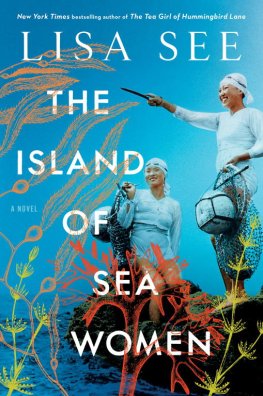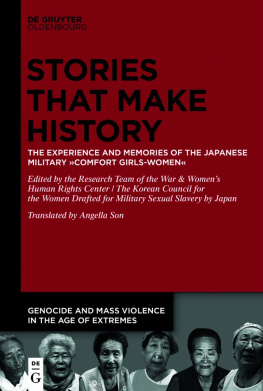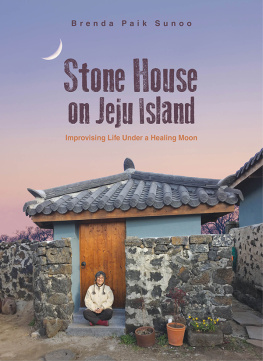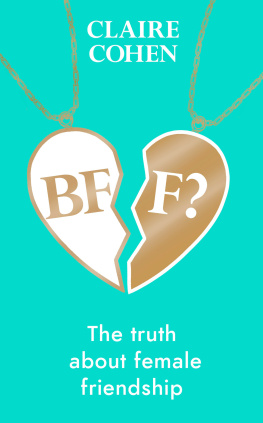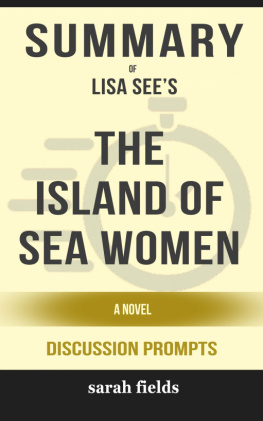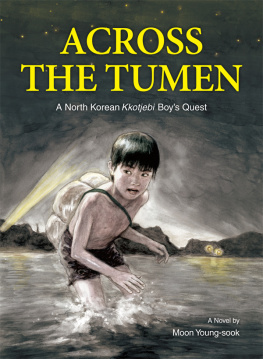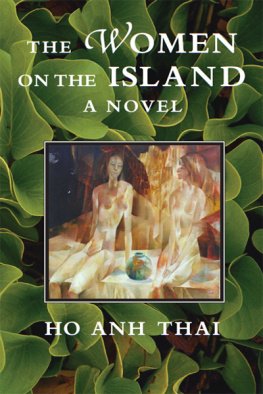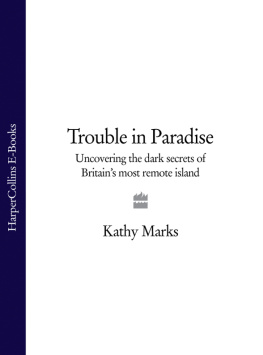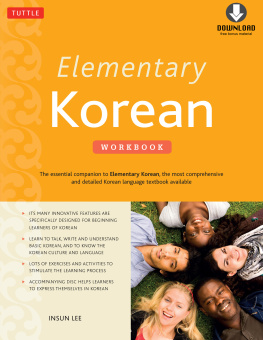Lisa See
THE ISLAND OF SEA WOMEN

Although parts of the story take place when the McCune-Reischauer system of romanization was standard, I have used Revised Romanization of Korean, which was formalized in 2000. All personal names are rendered in common spelling. Wherever possible, I have used Jeju words. On the mainland, halmeoni means grandmother. On Jeju, in a fitting example of the respect in which women are held for their strength, independence, and persistence, halmang means both grandmother and goddess. According to tradition, the title of halmang should follow the name, but to avoid confusion I have put it first: Seolmundae Halmang becomes Halmang Seolmundae or Grandmother Seolmundae.
Day 1: 2008

An old woman sits on the beach, a cushion strapped to her bottom, sorting algae thats washed ashore. Shes used to spending time in the water, but even on land shes vigilant to the environment around her. Jeju is her home, an island known for Three Abundances: wind, stones, and women. Today the most capricious of thesethe windis but a gentle breeze. Not a single cloud smudges the sky. The sun warms her head, neck, and back through her bonnet and other clothing. So soothing. Her house perches on the rocky shoreline overlooking the sea. It doesnt look like muchjust two small structures made from native stone, but the location Her children and grandchildren have suggested she allow them to convert the buildings into a restaurant and bar. Oh, Granny, youll be rich. Youll never have to work again. One of her neighbors did as the younger generation asked. Now that womans home is a guesthouse and an Italian restaurant. On Young-sooks beach. In her village. She will never let that happen to her house. There isnt enough money in all the pockets in all Korea to make me leave, Young-sook has said many times. How could she? Her house is the nest where she hides the joy, laughter, sorrows, and regrets of her life.
She is not alone in her work on the beach. Other women around her agein their eighties and ninetiesalso pick through the algae that has come to rest on the sand, putting whats salable in small bags and leaving the rest. Up on the walkway that separates this cove from the road, young coupleshoneymooners, probablywalk hand in hand, heads together, sometimes even kissing, in front of everyone, in broad daylight. She sees a tourist family, clearly from the mainland. The children and husband are so obvious in their matching polka-dot T-shirts and lime-green shorts. The wife wears the same polka-dot T-shirt, but otherwise every bit of her skin is protected from the sun by long pants, sleeve guards, gloves, hat, and a cloth mask. Children from the village climb over the rocks that spill across the sand and into the sea. Soon theyre playing in the shallow depths, giggling, and challenging each other to be the first to reach the deepest rock, locate a piece of sea glass, or find a sea urchin, if theyre lucky enough to spot one. She smiles to herself. How differently life will unfurl for these young ones
She also observes other peoplesome not even trying to hide their curiositywho stare at her before shifting their gazes to some of the other old women on the shore today. Which granny looks the nicest? The most accessible? What those people dont understand is that Young-sook and her friends are appraising them too. Are they scholars, journalists, or documentarians? Will they pay? Will they be knowledgeable about the haenyeosea women? Theyll want to take her photo. Theyll shove a microphone in her face and ask the same predictable questions: Do you consider yourself a granny of the sea? Or do you think of yourself more like a mermaid? The government labels the haenyeo a cultural heritage treasuresomething dying out that must be preserved, if only in memory. How does it feel to be the last of the last? If theyre academics, theyll want to talk about Jejus matrifocal culture, explaining, Its not a matriarchy. Rather, its a society focused on women. Then theyll begin to probe: Were you really in charge in your household? Did you give your husband an allowance? Often shell get a young woman wholl ask the question Young-sooks heard discussed her entire life. Is it better to be a man or a woman? No matter what the inquiry, she always answers the same way: I was the best haenyeo! She prefers to leave it at that. When a visitor persists, Young-sook will say gruffly, If you want to know about me, go to the Haenyeo Museum. You can see my photo. You can watch the video about me! If they still wont go Well, then, she becomes even more direct. Leave me alone! I have work to do!
Her response usually depends on how her body feels. Today, the sun is bright, the water glistens, and she perceives in her boneseven though shes only sitting on the shorethe weightlessness of the sea, the surge that massages the aches in her muscles, the enveloping chill that cools the heat in her joints, so she allows herself to be photographed, even pushing back the brim of her bonnet so one young man can see your face better. She watches as he edges toward the inevitable awkward subject, until he finally arrives at his query: Did your family suffer during the April Third Incident?
Aigo, of course she suffered. Of course. Of course. Of course. Everyone on Jeju Island suffered, she answers. But that is all she will say about it. Ever. Better to tell him this is the happiest time of her life. And it is. She still works, but shes not too busy to visit friends and travel. Now she can look at her great-granddaughters and think, Thats a pretty one Thats the smartest one yet. Or That one better marry well. Her grandchildren and great-grandchildren give her the greatest joy. Why couldnt she have thought like that when she was younger? But she couldnt have imagined how her life would turn out back then. She couldnt have imagined today even in a dream.
The young man wanders off. He tries to talk to another woman, Kang Gu-ja, whos working about ten meters to Young-sooks left. Gu-ja, always crotchety, wont even look up. He presses on to Gu-jas younger sister, Gu-sun, who yells at him. Go away! Young-sook snorts appreciatively.
When her small bag is full, she shakily gets to her feet and shuffles to the collection of larger bags shes been filling. Once the small bag is emptied, she hobbles to an area of the beach untouched by the others. She settles back down, positioning her cushion beneath her. Her hands, though gnarled from work and deeply creased from years of exposure to the sun, are agile. The sound of the sea The caress of warm air The knowledge that she is protected by the thousands of goddesses who live on this island Even Gu-suns colorful epithets cant sour her mood.
Then in Young-sooks peripheral vision she glimpses another family group. They arent dressed alike, and they dont look alike. The husband is white, the wife is Korean, and the childrena small boy and a teenage girlare mixed. Young-sook cant help it, but seeing those half-and-half children makes her uncomfortable: the boy in shorts, a superhero T-shirt, and clunky tennis shoes, the girl in shorts that scarcely cover what theyre supposed to cover, earbuds plugged into her ears, and wires trailing down over her barely-there breasts. Young-sook guesses theyre Americans, and she watches warily as they approach.
Are you Kim Young-sook? the woman, pale and pretty, asks. When Young-sook gives a slight nod, the woman continues. My name is Ji-young, but everyone calls me Janet.
Young-sook tries out the name on her tongue. Janet.

